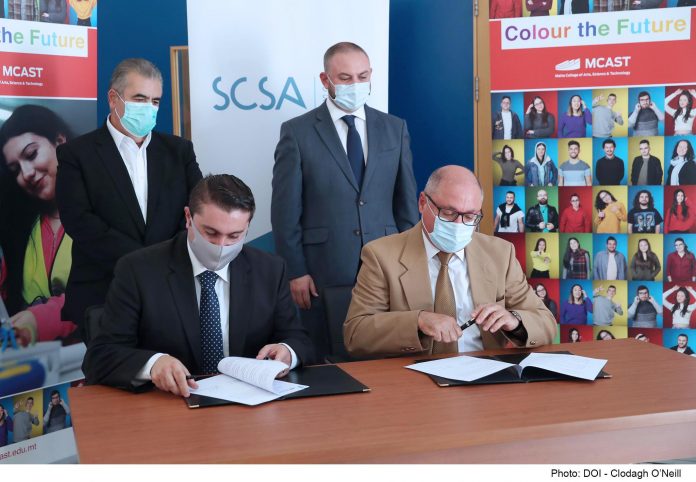
Minister for Education and Employment Owen Bonnici, together with Minister for the Family, Children’s Rights and Social Solidarity Michael Falzon, presided over the signing of a Memorandum of Understanding (MOU) between the Malta College of Arts, Science and Technology (MCAST) and the Social Care Standards Authority (SCSA),
Minister Owen Bonnici said that, “Thanks to this MOU, we are celebrating the vast types of courses offered by MCAST. We are always looking at the current and future needs in the employment sector and seeing that the educational choices being provided to our students match these needs. Apart from offering the opportunity to study in different fields, as in this case, we have also seen that our students gain valuable hands-on experience related to their studies. These apprenticeships will be carried out in three SCSA Directorates. Our Ministry has always been committed to develop and improve the curricula depending on the country’s and our students’ needs, as we are doing today.”
The Minister for the Family, Children’s Rights and Social Solidarity Michael Falzon praised the cooperation between the two Ministries, and emphasised the need for more students to follow social courses, as society constantly needs more professionals in the area. Minister Falzon spoke about the importance of an effective social welfare state, which vulnerable people can always feel comfortable to rely on. The Ministry for the Family, Children’s Rights and Social Solidarity continually invests in training and new courses, so as to strengthen professionals’ ability in the area. Additionally, the final aim is to engage more social workers to join agencies which work directly with people needing social services.
MCAST Principal and CEO Prof Joachim James Calleja said, “Since 2018, MCAST has signed over 25 partnership agreements. We have continued to expand our network of contacts with the local and international industry. This agreement, in particular, is important to us, as MCAST’s Institute for Community Services (ICS) has worked very closely with SCSA since its inception. Last year, we held a seminar for ICS students at level 4 and level 6, which led to a sound discussion on the standards and current practices within the social care sector. The centrality of work-based education is present in all MCAST study programmes. Students are increasingly opting for MCAST as their first choice precisely because they are looking for hands-on learning and industry experience.”
SCSA CEO Matthew Vella sustained that, in the past months, there was a very positive collaboration with MCAST students being hosted on placements. Such students had the opportunity to participate in current tasks and projects, getting a hands-on experience of the authority’s operations. As part of this agreement, students shall have the opportunity to have apprenticeships at the authority and work in innovative areas such as blockchain. Through such projects and other digital initiatives, the Social Care Standards Authority is aiming to enhance quality service provision in social welfare, especially with regards to digitalisation of the adoption process.
This MOU is based on objectives that focus on the relationship between education and the social welfare sector. These three objectives are;
Developing and improving the curricula related to social welfare provision and regulation in order to directly give due attention to the upcoming professionals who will be working in the field;
– Inducing the evolution of the courses to reflect the current and future needs in the social welfare sector as is indicated in the trends being noted;
– Providing the opportunity for students currently following related courses to gain valuable hands-on experiences in the field of their study by participating in apprenticeships at SCSA’s three directorates; the Operations Directorate, the Strategy and Social Intelligence Directorate, and the Governance and Assurance Directorate.
By achieving the above aims, the government will continue to strengthen the future of the social welfare sector and the valuable professionals working in this sector









